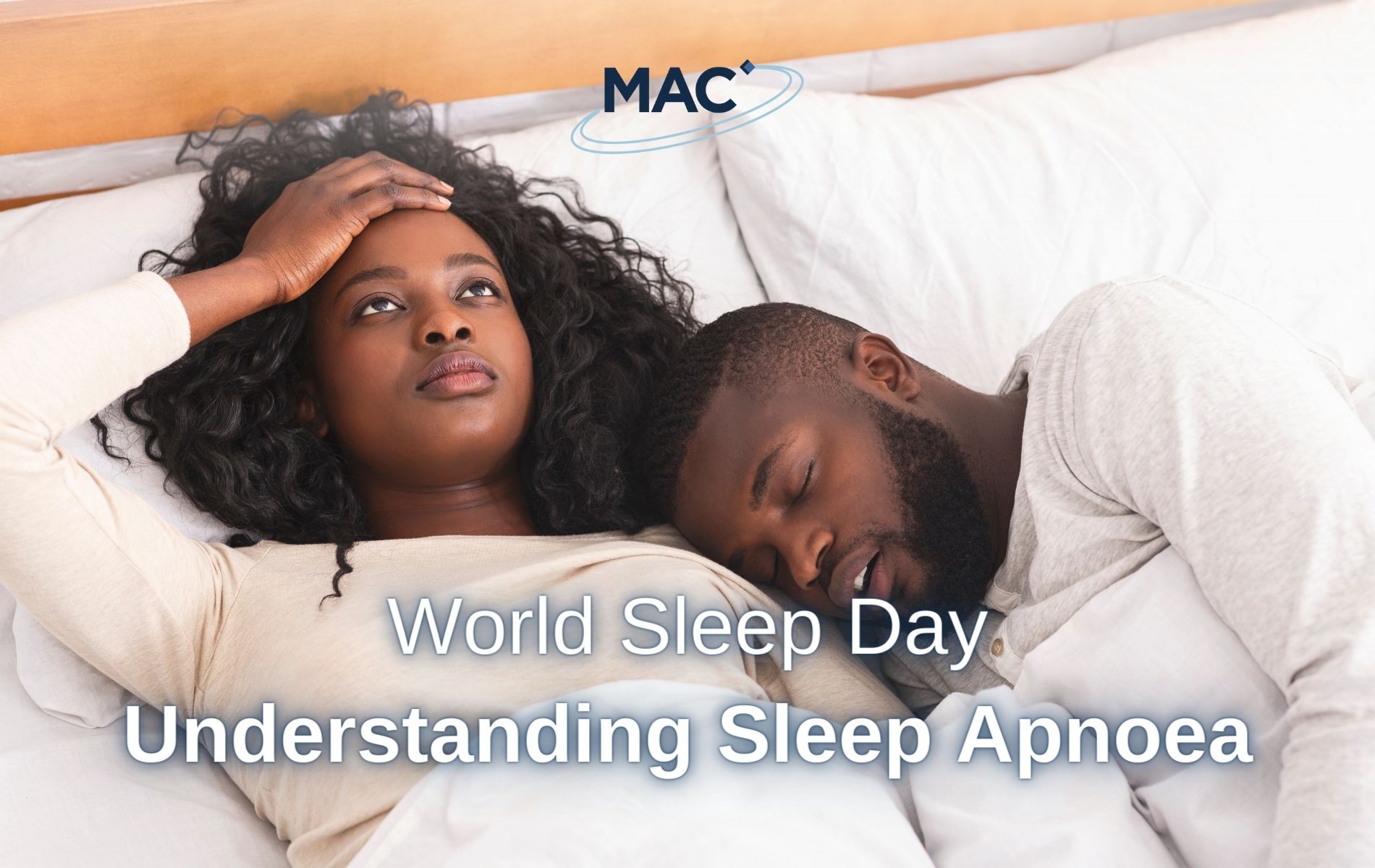On World Sleep Day, as we celebrate the importance of quality rest, we’re shining a light on a common yet often overlooked sleep disorder that profoundly impacts the lives of millions worldwide: Sleep Apnoea. Often dismissed as mere snoring or occasional interruptions in breathing during sleep, sleep apnoea is a serious condition with far-reaching consequences for both physical and mental health.
What is Sleep Apnoea?
Sleep apnoea mainly comes in the form of Obstructive Sleep Apnoea (OSA). OSA occurs when the muscles in the throat relax during sleep, causing the airway to become partially or completely blocked.
It’s estimated that around 1.5 million adults in the UK are living with OSA, however 85% of these are undiagnosed and, therefore, untreated1.
Another type of sleep apnoea is central sleep apnoea (CSA) which occurs when the brain fails to send proper signals to the muscles that control breathing. Both types can lead to fragmented sleep and inadequate oxygenation of the body, resulting in a myriad of health issues.
Impacts of Sleep Apnoea
One of the most immediate impacts of sleep apnoea is the disruption of sleep patterns. Those living with the condition often experience frequent awakenings throughout the night, preventing them from reaching the deep, restorative stages of sleep.
Consequently, they wake up feeling unrested and fatigued which can take a toll on cognitive function, mood stability, and overall productivity, affecting performance at work or in daily tasks; some studies have shown that the consequences of sleep apnoea can lead to increased road traffic accident rates2.
Beyond the immediate effects on sleep quality, sleep apnoea poses significant risks to cardiovascular health. The repeated episodes of oxygen deprivation and stress on the cardiovascular system can lead to hypertension, irregular heart rhythms, and even an increased risk of stroke or heart attack. In a study conducted on people admitted to hospital with coronary artery disease, 70% of those surveyed were living with OSA3.
Moreover, untreated sleep apnoea has been associated with conditions such as type 2 diabetes, obesity, and metabolic syndrome, further compounding its impact on overall wellbeing. In another study with patients living with type one diabetes, 12.4% of respondents were living with mild-to-moderate OSA4.
Quality of life is profoundly affected by sleep apnoea, extending beyond physical health to encompass emotional and social aspects. Chronic fatigue and irritability can strain relationships with loved ones and impact enjoyment of social activities. Research has found that those living with OSA were over three times more likely to be living with depression or anxiety than those without the condition5.
Additionally, the cognitive impairments resulting from sleep deprivation can hinder concentration, memory retention, and decision-making abilities.
Are you living with Sleep Apnoea?
Perhaps one of the most alarming aspects of sleep apnoea is its insidious nature. Many individuals may be unaware of their condition or dismiss their symptoms as mere nuisances, unaware of the serious health risks lurking beneath the surface. Consequently, diagnosis and treatment are often delayed, exacerbating the long-term consequences of the disorder.
If you or a loved one could be living with sleep apnoea, did you know that MAC Clinical Research offer sleep assessments at their state-of-the-art sleep clinic in Merseyside?
The sleep clinic uses the most up to date sleep technology and has five individually designed bedrooms (with ensuite) to optimise the patient experience and diagnostic accuracy. Our experienced sleep technicians and clinical team monitor and analyse the data that is recorded overnight to enable diagnosis of complex sleep disorders.
To find out more about our sleep clinic and register your details, visit our Sleep Clinic Webpage.
MAC Clinical Research is also running a number of clinical trials for various health conditions, investigating potential new treatments. You can find out more and register your interest via MAC’s current trials webpage.
1 Asthma + Lung UK – Obstructive Sleep Apnoea (OSA)
2 Asthma + Lung UK – Obstructive Sleep Apnoea Health Economics Report
3 American Thoracic Society – Obstructive Sleep Apnea and Heart Disease
4 Diabetes, Obesity and Metabolism – Prevalence of sleep apnoea in patients with type 1 diabetes and its association with comorbidities and diabetic complications: A French nationwide prospective study
5 Sleep Health – Sleep apnea, psychopathology, and mental health care




